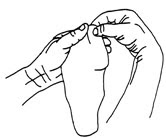Take Over Your Brain: Think Better and Forestall Alzheimer’s with a Reflexology Technique
Who wouldn’t want to think better as well as take arms against Alzheimer’s and, by the way, a whole host of neurological and psychiatric disorders?
That’s the promise of a recent study. The research measured with EEG’s the effects on the brain after the application of a reflexology technique. Pressure was applied for five minutes a day to the cortical reflex areas, surrounding the centers of both big toes. The effect over a week was significantly increased activity (a good thing) of brain waves. Impacted were gamma brain waves, associated with cognitive functions such as memory, perception, and attention as well as beta brain waves, associated with stress, anxiety and motor control.
Why is this important? Because of the role brain waves play. Brain waves allow information to be shared among parts of the brain. Think of a piece of music being played, orchestrated as brain waves are synchronized to coordinate and interpret sights and sounds such as the person we see and the conversation we have.
Abnormal brain waves are associated with a number of neurological or psychiatric disorders. For those with Alzheimer’s and other disorders gamma brain waves are known to slow down. Resulting is interruption in what gamma waves do which is as noted by researchers: “Gamma activity represents an important marker of successful memory formation, episodic recall and other behavioral and cognitive functions. Sensorimotor, learning memory, information processing, and behavioral functions are important in everyday life of humans and are also integral in execution of life processes. Increase in gamma active is also associated with emotion.” (1)
Other neurological or psychiatric disorders associated with abnormal brain waves are: autism, ADHD (attention-deficit hyperactivity disorder), Parkinson disease and epilepsy as well as schizophrenia, depression and chronic pain.
The researchers concluded: “Thus reflexotherapy may serve as a technique that can be used to increase cognitive functions in humans.” The potential impact on lives can be imagined. Talk to almost anyone and you’ll find concern for someone with a problem as mentioned above. A friends, family member or even themselves diagnosed with a disorder lacking a clear therapeutic path. Could a simple reflexology technique, easy-to-do and with no cost associated, offer relief?
To consider a further possibility, consider what happened when researchers applied a sensory technique, LED light therapy, to Alzheimer’s mice. Exposing the mice to lights flickering at the speed of gamma brain waves (40 hertz per second) “sharply reduced” the build-up of beta-amyloid plaque in the mice brains. Such plaque is a tangle of proteins common to those with Alzheimer’s. This result in the research of MIT neuroscientist Li-Huei Tsai is thought to be spurred by increased activity of mitaglia, immune cells typically dormant in those with Alzheimer’s. The results showed a “sharp reduction” by half in the beta-amyloid plaques.
Could reflexology create such change? The possibility may exist. “First, though, they’d (MIT researchers) would like to determine how long the effects of the (light therapy) intervention last and whether other modes of sensory stimulation, such as sound or touch, have similar effects on the regions of the brain that process those inputs. Ultimately, the goal is to find multiple ways to noninvasively stimulate the brain so that the induced gamma waves propagate strongly throughout it. ‘If we can activate gamma in many different brain regions, perhaps we can get a huge area of the brain involved,’ says Tsai. ‘Treating the whole brain will be important for people with Alzheimer’s disease.’” (2)
(1) Cevat Unal, Menizibeya O.Welcome, Mariam Salako, Faruk Abdullahi, Nuhu M. Abubakar, Vladimir A.Pereverzev, Siti Sugih Hartiningsih, Senol Dane, “The effect of foot reflexotherapy on the dynamics of cortical oscillatory waves in healthy humans: An EEG study,” Complementary Therapies in Medicine, Volume 38, June 2018 , Pages 42-47
(2) Dougherty, Elizabeth, “Seeing the Light, Aging Brain Initiative researchers discover a potential Alzheimer’s therapy,” Spectrum (MIT), Spring 2017

No comments:
Post a Comment